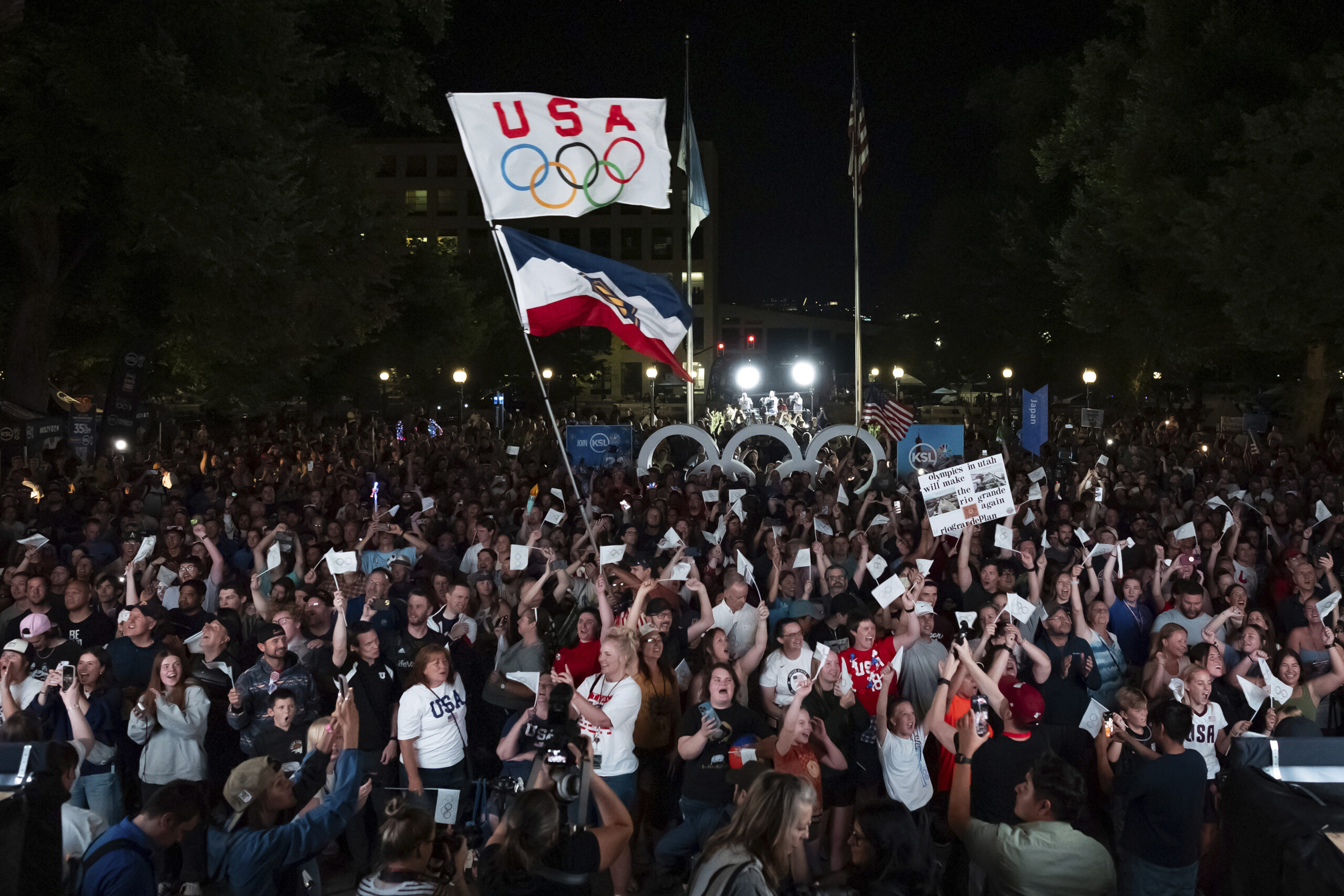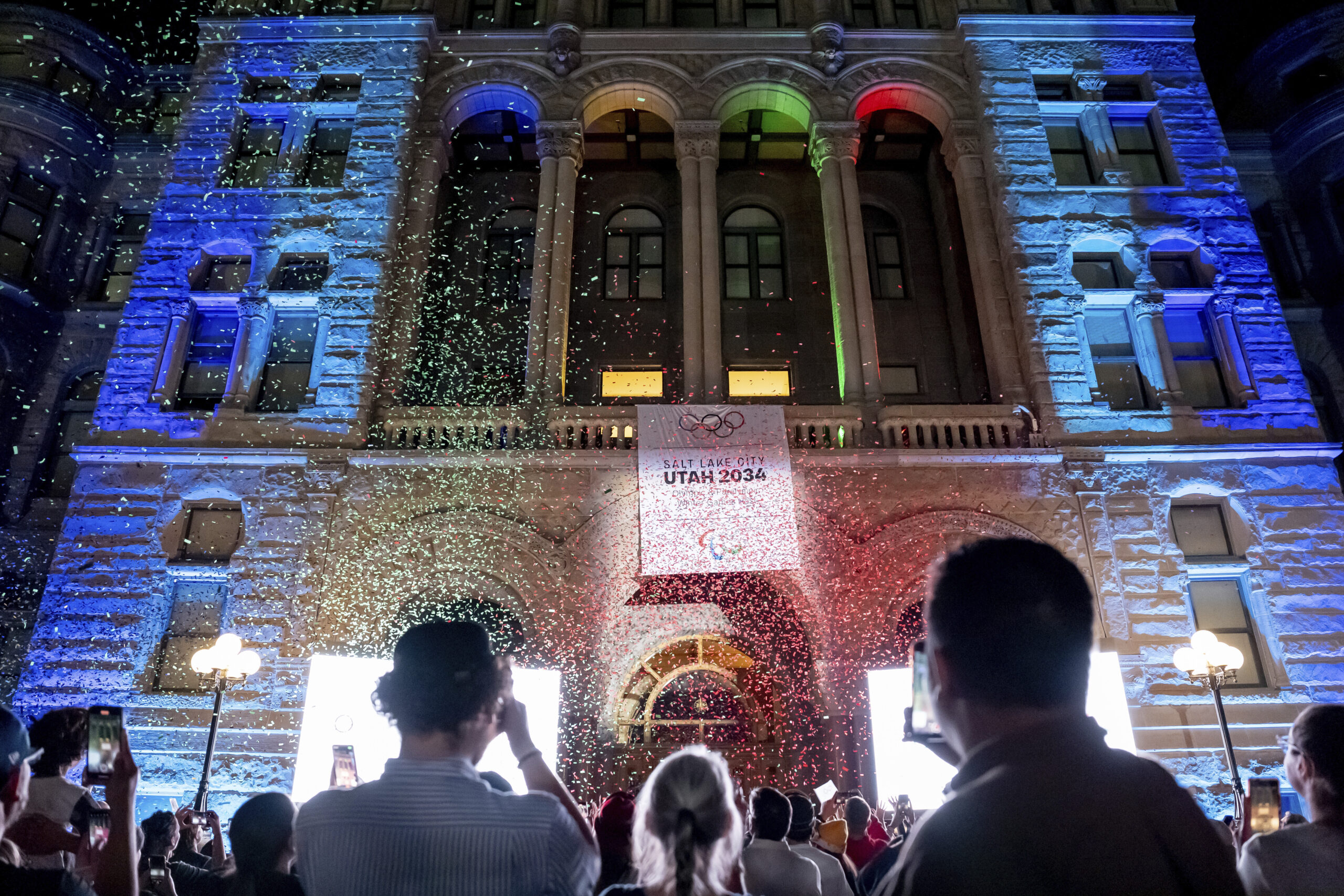Salt Lake City, Utah to host 2034 Winter Olympics

People celebrate while watching a live feed from Paris moments after the International Olympic Committee awarded Salt Lake City the 2034 Winter Olympics, Wednesday, July 24, 2024, in Salt Lake City. (AP Photo/Spenser Heaps)
SALT LAKE CITY — Salt Lake City was formally awarded the 2034 Winter Olympics and Paralympics following a vote Wednesday by the International Olympic Committee in Paris, giving Utah its second Games after hosting in 2002.
About a thousand sports fans gathered in downtown Salt Lake City at 3 a.m. local time — 11 a.m. in Paris — to watch the long-anticipated announcement on a livestream. Some dressed in ski gear in the summer heat, while others donned Team USA merchandise and waved flags with the Olympic rings. The crowd erupted in cheers as Olympic officials made their final decision to return to a city where they said the local enthusiasm was palpable even two decades after it first hosted.
Utah’s capital city was the only candidate for 2034 after the Olympic committee gave Salt Lake City exclusive negotiating rights last year. Climate change and high operational costs have reduced the number of cities willing and able to welcome the Winter Games.
READ: Sapporo gives up 2030 Winter Olympics bid
Utah has capitalized on low interest elsewhere, pitching itself to Olympic officials as an eager repeat host if the committee eventually adopts a permanent rotation of Winter Olympic cities. Olympic Games Executive Director Christophe Dubi said Salt Lake City would be a prime candidate for such a plan.
Local leaders had their sights set on hosting multiple times even before Salt Lake City welcomed its first Games, bid team spokesperson Tom Kelly said. Remnants of the 2002 Games are nestled throughout the city and have kept the Olympic fever alive. Organizers of the 2034 Games touted that enduring enthusiasm throughout the selection process and showed visiting Olympic officials how they have preserved nearly all the venues used in 2002.
“Enthusiasm for the Games was always our feeling, on the first minute to the last minute, in every interaction we had, both at the venues and in our meetings with athletes, sports leaders, politicians and the private sector,” Karl Stoss, chairman of the International Olympic Committee’s Future Host Commission, told the full committee Wednesday morning in Paris.
Darrell Robinson of Herriman, Utah, celebrated with his family in the early hours Wednesday after his daughter, who was too young to remember Utah’s first Olympics, begged him to join her at the Salt Lake watch party. Robinson also was present when it was announced that the city would host the 2002 Games, and he said it was amazing to relive that moment.
The 2002 Games closely followed the Sept. 11, 2001, terrorist attacks and provided a unifying atmosphere that Robinson said was needed at the time.

Confetti falls as the logo for the 2034 Winter Olympics is unveiled on the Salt Lake City and County Building after Salt Lake City was announced as the host city, Wednesday, July 24, 2024, in Salt Lake City, Utah. (AP Photo/Spenser Heaps)
“Everyone was really united, and we were able to invite all these countries and just heal,” he said. “That’s something we need again.”
Wednesday’s local party coincided with a state holiday marking the date Mormon pioneers discovered the Salt Lake Valley in northern Utah. A drone show lit up the sky over City Hall, and parade floats lined the streets, merging the two celebrations into one.
In its final presentation to Olympic officials, the Utah bid team outlined its plan for one of the most compact layouts in Olympic history, with all venues within a one-hour drive of the athletes village on the University of Utah campus. The plan requires no new permanent construction, with all 13 venues already in place and each having played a role when the city first hosted.
What was expected to be a simple coronation turned into a complicated political negotiation in which the Olympic committee strong-armed Utah leaders into helping them lobby the U.S. government to end an FBI investigation into a suspected doping coverup.
Before the vote, Olympic officials inserted into Salt Lake City’s host contract a clause effectively demanding that local organizers, including Utah Gov. Spencer Cox, push to shut down the probe or risk losing the Games. Cox agreed to the committee’s demands and celebrated the final decision, but he said after the vote that the shakeup nearly delayed the bid agreement.
Securing the bid was central to Cox’s goal of cementing the state as North America’s winter sports capital. He and other local leaders were in Paris for the presentation, while many winter Olympians stayed in town to train and join in the festivities.
American freestyle skier Christopher Lillis, a gold medalist at the 2022 Winter Olympics in Beijing, said the 2034 Games will be a dream come true for young people with Olympic aspirations. He has been training at nearby Utah Olympic Park and said the sports facilities in the area are “top notch.”
Kate Cross, the mother of a young girl who described herself as a “future gold medalist skier,” said the Olympics are the ultimate source of inspiration. Cross moved to Utah a few years after the 2002 Games and is excited to attend Olympic events in person for the first time — possibly as the parent of an athlete.
“We’re out here in the middle of the night because she’s too excited to sleep,” Cross said. “It’s given her something to strive for, a 10-year plan. As a parent, it’s amazing to see your kid that motivated.”